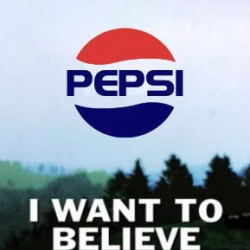Apologies for not tying all this together.
The paper I work for is in Delaware and I’ve spent the past week in Super-Tuesday-prep mode. So even though I live in Pennsylvania, and we’re not part of today’s festivities, I’ve had the nagging feeling all day that I should be voting.
“Soylent Green is poor people!” TBogg 10, Megan McArdle 0. McArdle argues that “the poor don’t need more food,” because, like, she once saw a poor person who was fat and they were eating, like, potato chips. Or something.
Expect more of this sort of thing if the economy gets worse. Increased insecurity leads to increased anxiety which leads more people to, like McArdle, close their eyes, shove their fingers in their ears, and chant, “The poor deserve their poverty, so that can’t happen to me. The poor deserve their …”
Michael Joseph Gross on Richard Mellon Scaife in Vanity Fair, “A Vast Right-Wing Hypocrisy.” It’s a baroque epic of appalling behavior. (Sure, the super-rich sometimes make bad choices — but do they eat potato chips?) Scaife is quite candid about his disdain for the moralizers he’s funded over the years, and that he regards them as simply tools to be used in the political defense of concentrated wealth.
What I found most interesting was Scaife’s account of his lunch with Bill Clinton. The former president — the object of decades of Scaife-funded vitriolic nonsense-gates — seems to have sized up what might be accomplished during such an encounter and then, instead of revisiting the misery of their long enmity, decided to treat the old buzzard the same as any other visitor who happened to have scads of extra money lying around:
Scaife left the meeting with an autographed copy of Bill Clinton’s My Life and a head full of thoughts about the “scourge of AIDS” in Africa, which the two had discussed in detail — though Scaife emphasizes, twice, that Clinton “did most of the talking.” Back in Pittsburgh, Scaife decided to send a $100,000 personal check to the Clinton Global Initiative. That got him thinking about AIDS locally, he says, and so when he found a direct-mail solicitation for Persad, Pittsburgh’s AIDS service center, in his mailbox, he wrote that group a check, too.
“People like what other people like.” Every DJ already knew that. I made the mistake, back in college, of playing “Love Shack” before it was a hit. That cleared the dance floor and raised a chorus of derisive hoots. Six weeks later, the same crowd/flock was requesting the same song.
* * *
“Martin Marty on evangelicals:
“Anything anybody can say about Evangelicalism is true” is my take-off from Emmett Grogan’s “Anything anybody can say about America is true.” He and his truism issued from the ’60s, a period when I would not have known about or spoken of the Protean character of modern American evangelicalism. Back then, schooled by the likes of the late Carl F. Henry, we thought Evangelicalism cohered around a distinctive theology born of 19th century Princeton-born thought and 20th century Billy Graham evangelistic style. It was “soft” and “open” post-fundamentalism at its core.
These years, with one-fourth of America identifying or being identified as evangelical, leaders within, critics without, and editorialists within and without are trying to find coherence. Of course, there are some continuities, such as: 1) a high view of biblical authority, but by no means always or any longer the old doctrine of inerrancy; 2) a high Christology but one with bewildering variations; 3) a commitment to evangelizing, making converts, and growing, but in competitive and sometimes mutually contradictory forms; 4) a dream of community, but now challenged by individualist, go-it-alone spiritualities and mega- and post- and emergent- and traditional styles; 5) an involvement with public life, but by no means reducible to the politically “Christian right.”
I stumbled across that while failing to find a convenient distillation online of Marty et. al.’s exhaustive and insightful study, The Fundamentalism Project, which is my guess as to the source of what Raka described in comments earlier as “an extremist for cause A will have more ideological and behavioral resemblance to an extremist for any given cause X than they would to a moderate for cause A.” That, in a nutshell, was what the project’s research concluded.
Anyway, as Marty says, modern American evangelicalism is Protean. It is also frequently Procrustean, but rarely Promethean. Discuss.
* * *
I’ve mentioned before the separation between advertising and editorial at newspapers. Among other things, that means when your ad department puts together the announcement of primary election ads, nobody in editorial sees them until after they hit the page. So it wasn’t until the presses rolled that we noticed a Very Bad typo — Monday’s ad said that the polls today would close at 1 p.m. instead of 8 p.m. Not good. Really, really not good. We’ve got the proper time prominently displayed on every page of today’s paper, but still. Really, really not good.
Benighted, i.e., Praline’s book. (Not this Praline, this one — tricky business, plugging someone’s book while still respecting their use of a screen name.) No, I haven’t read it yet, but the raves in comments here have pushed it to the top o’ the stack.
You won’t find Praline listed yet at “Literature Map,” but it’s still a fascinating Web thingie. Type in an author’s name and it displays a map-like array of other authors. “The closer two writers are,” it says, “the more likely someone will like both of them.” Every example I’ve searched has made me think both “Ah, yes, that makes sense” and also “WTF?” (such as the Stephen King/Agatha Christie/Kurt Vonnegut cluster — ??? — that showed up when I looked up Neil Gaiman).
Eight days until the first pitchers and catchers report to spring training. Ten days until Johan Santana reports to Port St. Lucie. I’m heading south myself — gotta get to work early tonight because the polls in Delaware close at 8 p.m. Once again, that’s 8 p.m.
















